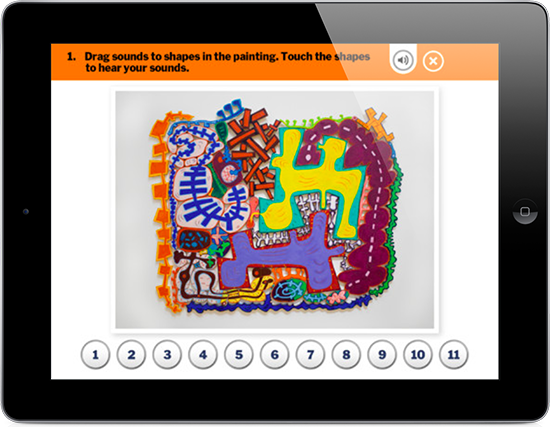The sublime James McNeill Whistler once said, “Nature contains the elements, in colour and form, of all pictures, as the keyboard contains the notes of all music. But the artist is born to pick, and choose, and group with science, these elements, that the result may be beautiful--as the musician gathers his notes, and forms his chords, until he bring forth from chaos glorious harmony.” In the years since, the relationship between art and music has progressed from a silent harmony to a colorful crescendo. Today, sound is a distinct, prize-winning, contemporary art category. It is also a natural accompaniment to other art forms. We hear it gushing through the neutral spaces in galleries, unmuting performance pieces, enlivening installations. And the power of sound is captured in a new iPad app from MOMA, where it’s a compositional tool in itself!
The MOMA describes Art Lab as an app where users “can explore how artists use line, shape, and color, and create your own artwork inspired by MoMA’s collection.” One can play a surreal game of exquisite corpses, compose a collage dictated by chance, create line designs, and use scissors to snip one’s way into a drawing. But what is truly remarkable is a host of symphonic (or noisy) activities such as creating sound compositions and shape poems.
Sound compositions encourage users to associate colors with sounds and inspiration is never too far; you could ask yourself, oh what would Whistler do? Or what the Dadaists wouldn’t? And maybe, would the Surrealists dream of this? The other audible activity, shape poems, asks users to connect words and lines in a clever visual-verbal challenge.
Art Lab may be aimed at ages 7 and up, but up is a subjective term. It's certainly not mere child’s play! Moreover, you can relive the creative process of artists such as Jean Arp, Brice Marden, or Henri Matisse (and affirm your own creative genius).
Art Lab’s endeavor is a unique interplay of color, shape, line, sound, and word! Especially the emphasis on the relationship between sound and art, which can be a difficult one to grasp! Simply because it requires more effort to imagine the music behind a pictorial composition. Thus, unlike other apps which are constantly testing our ability to see what is there, Art Lab asks us to hear what isn’t.
I realize that Whistler (in his above quote) didn’t intend the relationship between music and nature to be taken quite so literally. He simply wanted to express a beautiful parallel between sound and color harmonies. But isn’t it amazing that Art Lab has (unwittingly?) made that parallel an actuality! If only there was such an app for the works of James McNeill Whistler!


